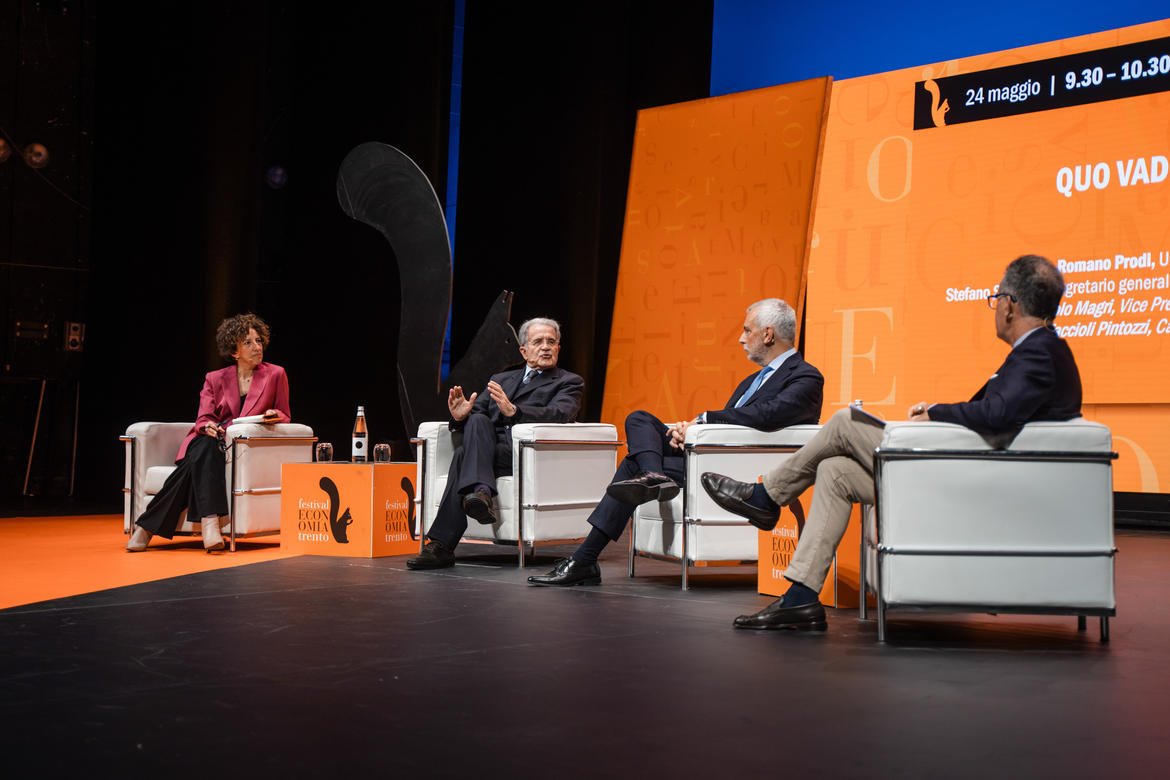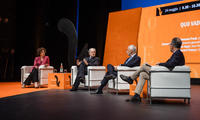
Former president Romano Prodi debated today about the future of Europe on the stage of Teatro Social in the Trento Festival of Economics together with Stefano Sannino, Secretary-General of the European Union External Action Service, Liliana Faccioli Pintozzi, Head of International News Sky TG24 and Paolo Magri, Executive Vice President Italian Institute for International Political Studies. Several topics emerged as the current geopolitical situation is growing more complex than ever: from Taiwan to Ukraine, without forgetting Serbia, the USA, Russia and China - all of which are in the midst of the elections.
European elections are just a few weeks away. "We remember all the wars in the past. There's no way back for Europe; and in the end, when people go to vote, in their inner consciousness they know it", Prodi stated. And he joked: “Brexit was the vaccine against anti-europeism. Even Orban may say everything he wants, but Hungary will not opt out”.
Prompted by a question on the mortal dangers for Europe - a direct quotation of President Macron, Sannino listed all potential dangers for Europe: from the elections in the US and the risk which its potential isolationist policies would bring about the decisions which need to be made in Europe regarding security, energy, technology and the relationship with China. “The end of the bipolar or unipolar system has been creating a situation of chaos. The most difficult challenge? Having a military capacity at an EU level”, he stated.
And that’s where Europe needs to leap forward, according to Prodi: “At a European level, much mediation has always been taking place. The last European Council meeting was debating defence and how to support it financially. Yet, there is no debate on what needs to be done. In this situation, having more or less conservatives is not the point. We need to leap forward”.
This applies in general but especially to the foreign and security policy: the same institutions and mechanisms that have been governing a Union of 27 states need to change if other countries are to be included, and that involves about ten candidates from the Balkans to Ukraine, not to mention Turkey. According to Sannino, “Everybody wanted the 2004 European enlargement; it was the unification of the continent and the end of the Cold War. Deciding to include Ukraine in the EU would bring another remarkable change in checks and balances. It would create some problems regarding the CAP and structural funds, for instance, so we need to imagine a new way of managing enlargement, which is still our strongest tool of foreign policy”. New challenges lay ahead not only when it comes to enlargement, but also, for instance, in the relationships with China. “As EU, we negotiated with China for 6-7 years - not to reach an agreement, just to bring us closer to them”, stated Prodi. “Then, there was a deadlock, namely the US elections and the three months between the end of Trump’s mandate and the beginning of Biden’s mandate, where nothing was done. At that moment, Angela Merkel supported the European approval of a position with China that focused strongly on German interests. Then Biden entered the White House, everything broke down, and the situation with China changed again”, he added. The US has one foreign policy, while each European country tends to run negotiations independently: once again, a leap forward is needed. Prodi concludes: “We need to make enormous decisions. Otherwise, we will lose credibility. I believe either we decide now, or we become irrelevant at an international level”. The question remains: Quo Vadis, Europe?








